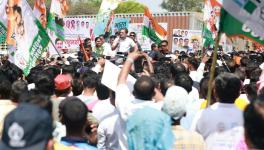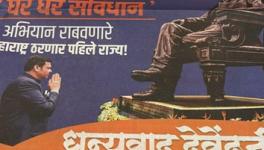Can Indians, Like Israelis, Make the Government Hear?
File Image
‘‘But he hasn’t got anything on,’ a small child said.
‘‘But he hasn’t got anything on!’ the whole town cried out at last.
‘The Emperor shivered, for he suspected they were right. But he thought, ‘This procession has got to go on.’ So he walked more proudly than ever as his noblemen held high the train that wasn’t there at all.’
Hans Christian Andersen, the prolific Danish author who died in 1875, is famed for his literary fairy tales. In the Emperor’s New Clothes, he narrates the story of an egocentric ruler exposed before his people by a child who dared speak the truth—the King was not wearing anything. But even though the child told the truth, the Emperor did not change his behaviour. What is unfolding in Israel’s Knesset reflects the same dynamic.
Prime Minister Benjamin Netanyahu, who leads the most far-right government in the country’s history—and faces charges of bribery and fraud, and whose wife was convicted for misusing State funds—has presided over the passage of a law that shields him from any action by the legislature or the judiciary.
According to the new law, not just Netanyahu, no future Prime Minister could be removed from their position even if they face criminal or civil charges. It can only be done if the Prime Minister or their cabinet decides to do so.
This amendment shielding the Prime Minister is part of a broader overhaul of the judiciary that ‘Bibi’ wants to implement. The changes to the law can nullify any judicial verdict that is adverse to the ruling dispensation through a simple majority in the House. The intended overhaul also makes the judiciary more pliant. But it has given rise to one of the biggest mass movements in Israel’s history. It has forced the Israel government to hold off on the implementation of the changed regulations.
The churning in Israeli society can be witnessed in the remarks of the famous author and academic Yuval Noah Harari, who said at a pro-democracy demonstration in Tel Aviv, “Netanyahu—Stop Your Coup or we Will Stop you.”
Bibi is not alone in the galaxy of world leaders with no qualms about “walking more proudly than ever”, even after being exposed for their wrongdoings.
Donald Trump—ex-president of the United States—is keen to launch himself as a candidate in the 2024 election. He is already first former United States president who faced impeachment twice. Now he has become the first to be indicted by a grand jury in the case related to hush money paid to a porn star before the 2016 election so she would not reveal her affair with Trump.
Despite well-documented malfeasance over decades, from fake university education to Covid-19 denialism to blatant lies about election fraud, his incitement of a deadly riot Trump could not be nailed earlier. Even with enough evidence of how he degrades women with his speeches and actions, it did not impact his image. Nor was there a significant drop in Trump’s popularity.
Political developments in India and consequent questions are not qualitatively different from what is unfolding in Tel Aviv or Washington, D.C. But the focus of the discussion here has shifted to the apparently miraculous rise of a business magnate—his alleged proximity to the topmost leader of the ruling dispensation is the talk of the town.
Despite the exposé on the group’s operations and questions about shell companies set up by it, the government has refused to order an enquiry through a Joint Parliamentary Committee.
How long this deliberate silence of the ruling dispensation on such a vital issue—which has severely impacted State-owned institutions such as the Life Insurance Corporation and State Bank of India—will continue is anybody’s guess.
But the ferocious manner in which the Bharatiya Janata Party (BJP) is going all out to silence the questioning Opposition has not only created a sense of unease within a small section of the party but has given credence to what some are jokingly referring to as the Modani model. According to those who believe it exists, the model’s lynchpin is a “conscious shift from pro-market policies to selective pro-business politics”. It is what was described, until 2014, as crony capitalism, but that’s a phrase we no longer bandy about in India’s mainstream press.
The ruling dispensation hoped the sudden disqualification of Congress leader Rahul Gandhi from Parliament would dampen the spirit of the Congress party and the rest of the Opposition. But the opposite has happened. The Congress seems to have re-energised itself—thanks to the Bharat Jodo Yatra from Kanyakumari to Kashmir and the party’s new stirrings of resolve. Against heavy odds, there is greater coordination among the Opposition, and most of the parties that will face off against the BJP in 2024 (or before) have unequivocally condemned the disqualification. They have termed it an attack on democracy itself.
Perhaps this will also create space to rekindle l’affaire Adani or make the possibility tangible that the more it lives on in people’s imagination, the more damaging it will prove for the BJP.
It will not matter if the Prime Minister keeps walking ‘more proudly than ever’.
The author is an independent journalist. The views are personal.
Get the latest reports & analysis with people's perspective on Protests, movements & deep analytical videos, discussions of the current affairs in your Telegram app. Subscribe to NewsClick's Telegram channel & get Real-Time updates on stories, as they get published on our website.






















